A Community Struggle to Maintain a Full-Service Grocery Sun Fresh at Linwood/Prospect Beset With Theft, Nearby Drug Use and Loitering
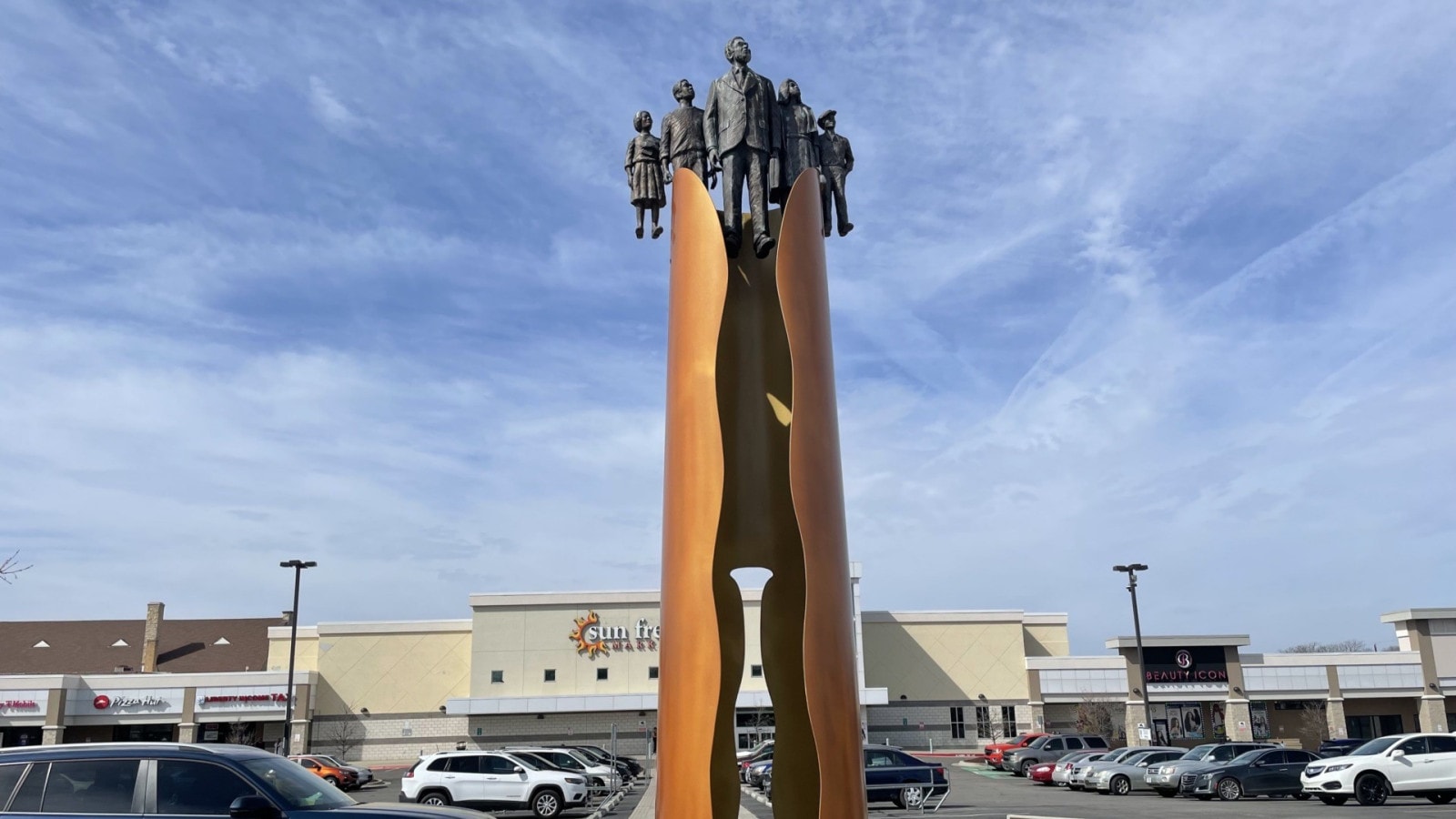 Famed Kansan Ed Dwight created the sculpture that rises in front of the Sun Fresh grocery in the Linwood-Prospect corridor. The figures at the top honor the contributions and struggles of Black Missourians. A pilot with the U.S. Air Force, Dwight was trained to be an astronaut during the administration of President John F. Kennedy as a part of Chuck Yeager's test program. (Mary Sanchez | Flatland)
Famed Kansan Ed Dwight created the sculpture that rises in front of the Sun Fresh grocery in the Linwood-Prospect corridor. The figures at the top honor the contributions and struggles of Black Missourians. A pilot with the U.S. Air Force, Dwight was trained to be an astronaut during the administration of President John F. Kennedy as a part of Chuck Yeager's test program. (Mary Sanchez | Flatland)
Published March 25th, 2024 at 6:00 AM
The disappearing grocery carts are a nuisance.
But keeping track of them is just one of the multitude of issues challenging the Sun Fresh in the Linwood/Prospect corridor of Kansas City.
Nearby homeless camps create a steady flow of people wandering through the parking lot, sometimes aggressively panhandling customers.
Guns, even a machete, have been carried into the store.
Clusters of people gather on surrounding properties, including the lawn of the Lucile H. Bluford branch of the Kansas City Public Library, across the street from Sun Fresh.
Untreated mental health conditions are apparent. So is drug use.
Some smoke “wet” marijuana joints dipped in formaldehyde or PCP, turning them into “zombies,” said Don Maxwell, a developer and longtime advocate of surrounding businesses and neighborhoods.
Maxwell helped orchestrate much of the redevelopment along the corridor nearly 40 years ago. He still works from an office nearby.
The number of people who are houseless or in obvious need of mental health treatment has soared in recent years, Maxwell said.
Available treatment has not.
Amidst it all are everyday shoppers trying to buy food and go about their lives.
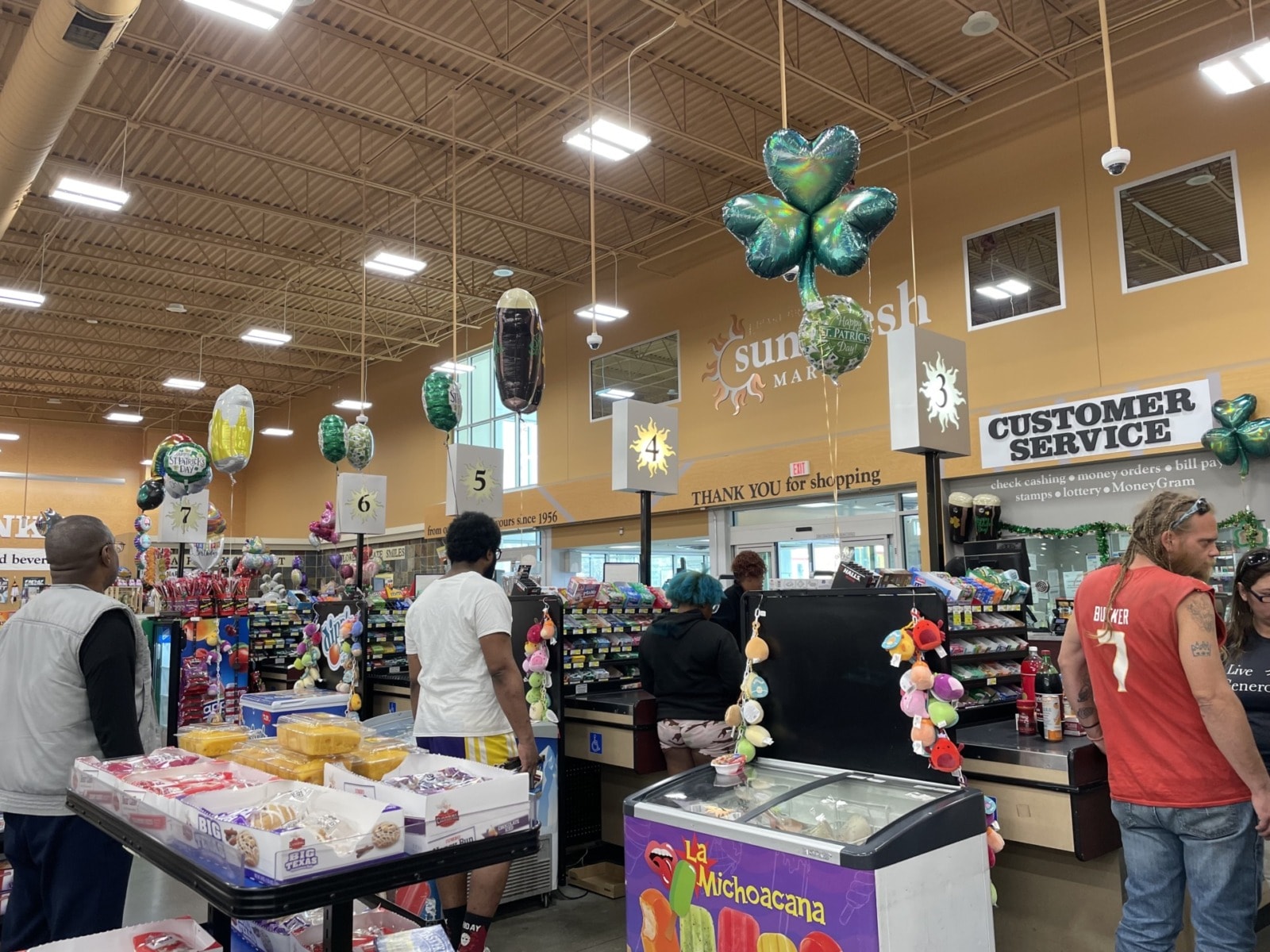
Sun Fresh provides “lifeblood” for surrounding businesses and residents, generating traffic and serving as an option in a part of Kansas City where full-scale groceries are rare, Maxwell said.
Its survival is seen as crucial for the broader community.
“The store is the nucleus of all of the business activity on Prospect,” Maxwell said. “And it provides the major appeal to the people in the community because it makes it convenient for them to shop and get fresh vegetables and fruit.”
Third District City Councilwoman Melissa Robinson shops at the store, aware that her dollars are tangible financial support and something that she can offer beyond the many community meetings, including with the police, that she’s attended to discuss the problems.
One recent Saturday she encountered a woman having a psychotic episode while in the store.
Stabilizing the struggling supermarket is paramount, said Robinson, a thought echoed by many others.
Maxwell is hopeful that switching to a new security firm for the surrounding development and the impact of a long-awaited office to base two Kansas City police officers and a social worker will help.
Work on the police satellite across the street from the grocery, called a community action network center, should be completed in about 45 days, he said.
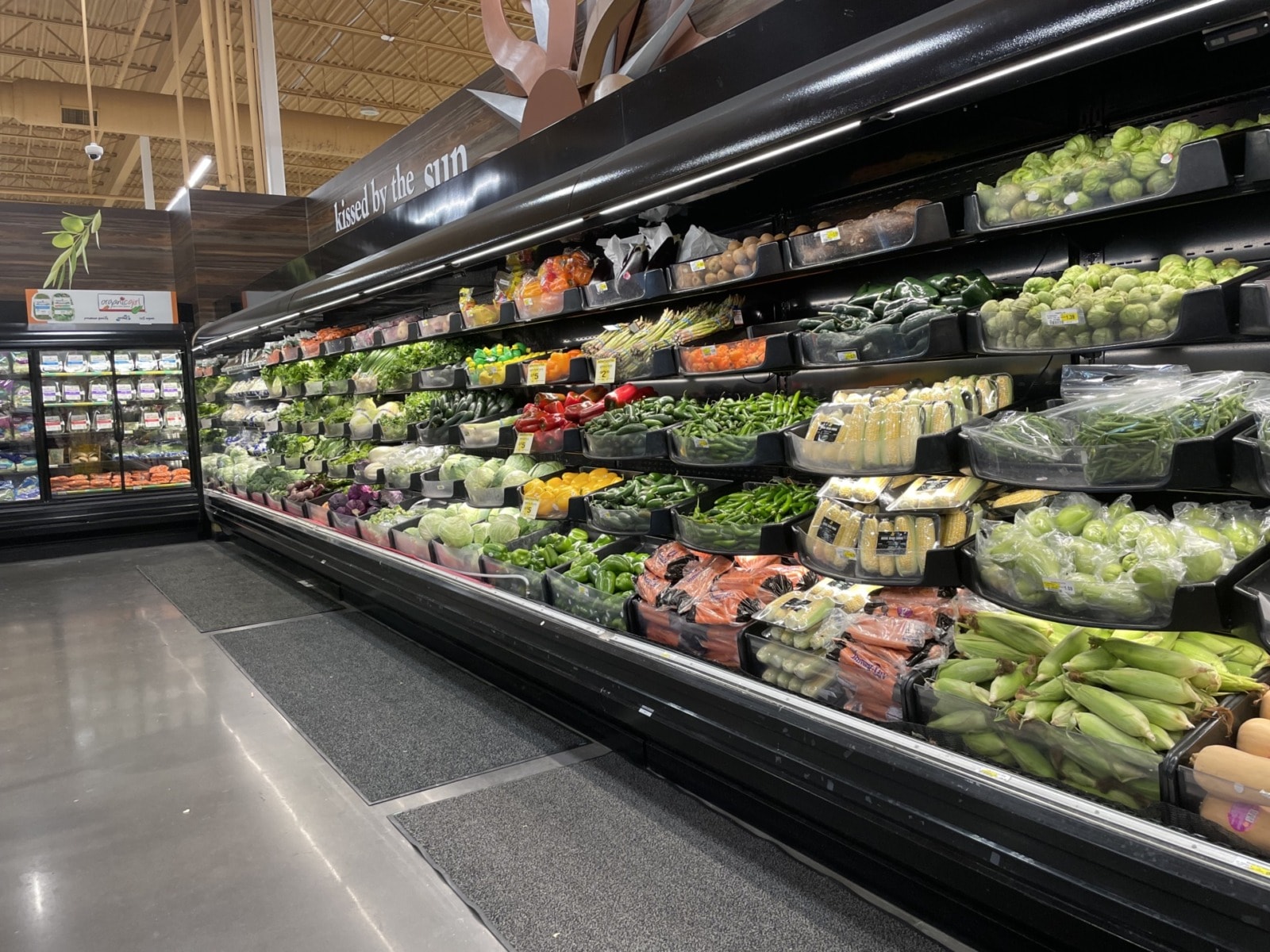
‘Obstacles I Never Imagined’
The Sun Fresh at Linwood (3110 Wabash Ave.) is one of the few full-service groceries east of Kansas City’s historic racial dividing line of Troost Avenue.
Once inside, shoppers are greeted by balloons and plants lining the floral department and an array of colorful fruits and vegetables. It’s set up like any suburban grocery.
In recent years, the nonprofit Community Builders of Kansas City became the reluctant but committed proprietors of the Linwood grocery.
The market would have closed if Community Builders had not stepped up as owner/operator when the previous owner retired in February 2022.
Some days, it’s still a struggle to stave off closure.
“We’re up against obstacles that I never imagined,” said Laura Hohlbaugh. “And I’ve been in retail for 18 years.”
Hohlbaugh held multiple management roles with Target before taking her present position a year and a half ago.
She is chief retail operations officer for CBKC Eats, the Communities Builders’ entity that operates the Sun Fresh on Linwood and another location on Martin Luther King, Jr. Boulevard (formerly Blue Parkway), which it took over in June 2020, at 4209 E. 50th Terr.
“I don’t like to see a mom and small children or a grandma walking into the store and having to pass a PCP deal in the parking lot,” Hohlbaugh said. “It’s like a gauntlet.”
But she knows that with so many of her shoppers without cars, the store is many people’s sole grocery option, at least for healthy meals.
“So, if we go away, what do they do?” she asked.
Visits by shoppers have dropped recently, from about 14,000 customers a week to about 9,000, she said. A complicating factor is rising wholesale prices.
“It’s gone up 13-14% in the last year,” Hohlbaugh said of her costs. “So, if the traffic stops, we’re not selling the groceries and then we can’t afford to buy the groceries to stock a shelf.”
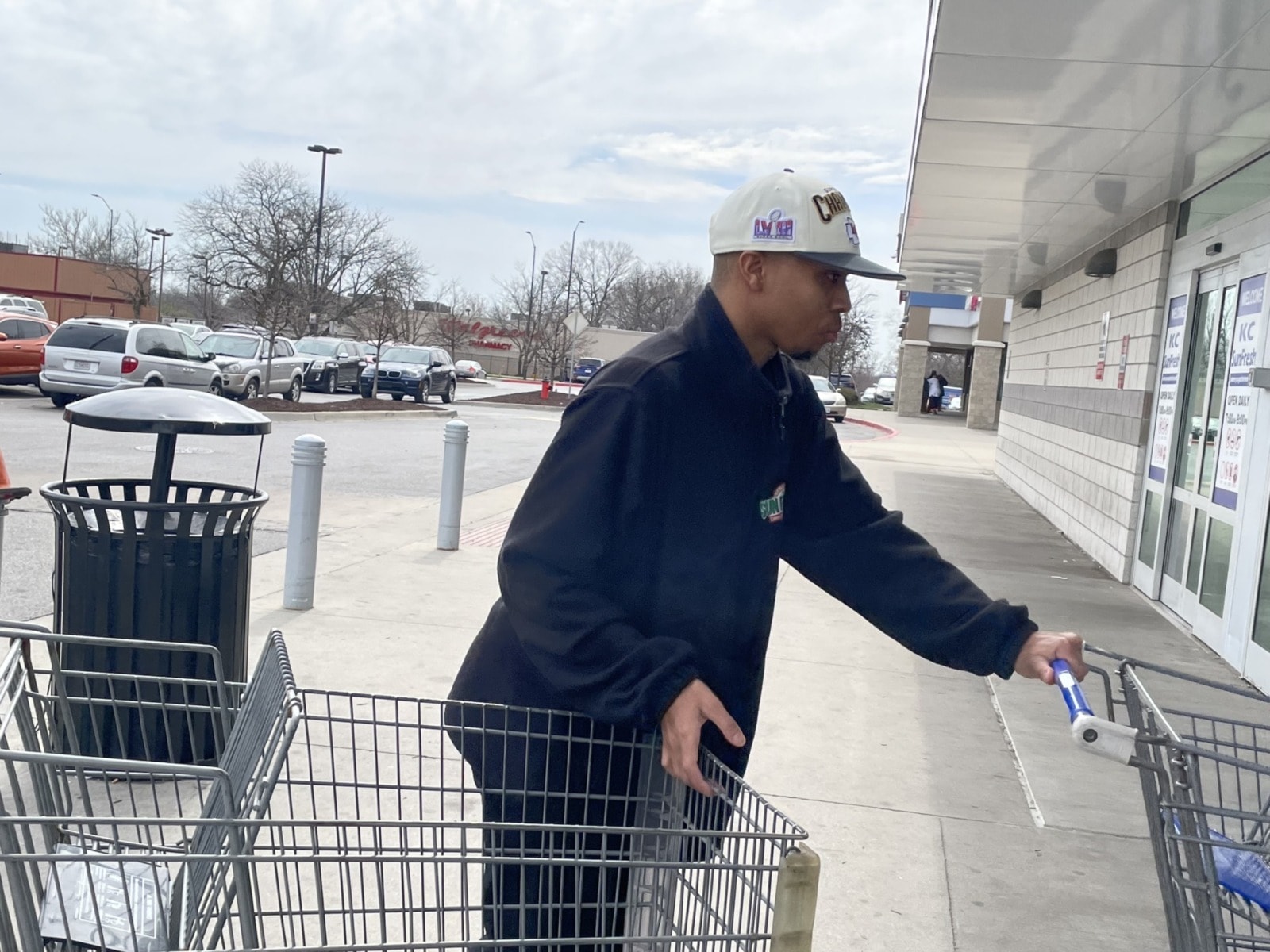
The missing carts, a reflection of people’s lack of transportation, is an aggravating factor.
The Linwood store was down to about 10 carts in early March.
A dearth of carts means people can’t shop for more than they can carry. And the grocery business is an industry run on tight profit margins, even in wealthier suburbs.
For a time, Hohlbaugh used a system that locked the wheels on the carts if they were taken beyond the parking lot’s perimeter. But desperate people quickly find a workaround, lifting the carts up and over the line that triggered the lock.
“Christmas” for Hohlbaugh arrived at midday on March 12.
A small pickup pulled up outside the store, pulling a flatbed. Community Builders had managed to obtain and refurbish 20 grocery carts.
Delon Canady, of the store’s price team workers, began helping roll the carts into the store.
Canady often trails customers as they exit the store, offering an extra hand if necessary.
But he also stays nearby to quickly retrieve the carts, bringing them back into the store.
Lining up the freshly unloaded stockpile of carts, he smiled broadly. He noted that the new carts don’t have locks on the wheels, so he’ll be extra vigilant.
“We appreciate you,” Hohlbaugh told him.
#FoodIsMedicine
The Sun Fresh at Linwood offers a concentrated study in social issues that get parked under titles like systemic racism, generational poverty and toxic stress.
Without access to healthy, affordable food choices, people’s mental and physical health can flounder. They won’t be able to work, to study, at least not at their best.
Programs at the store are being studied by area researchers to see if health outcomes can be improved.
“Double Up Food Bucks” allows people with SNAP benefits to earn another dollar to spend for every dollar spent on fresh fruits and vegetables, up to $25 per day.
The Mid-America Regional Council is invoiced monthly for the extra dollars to compensate the store.
Free healthy recipes are also promoted.
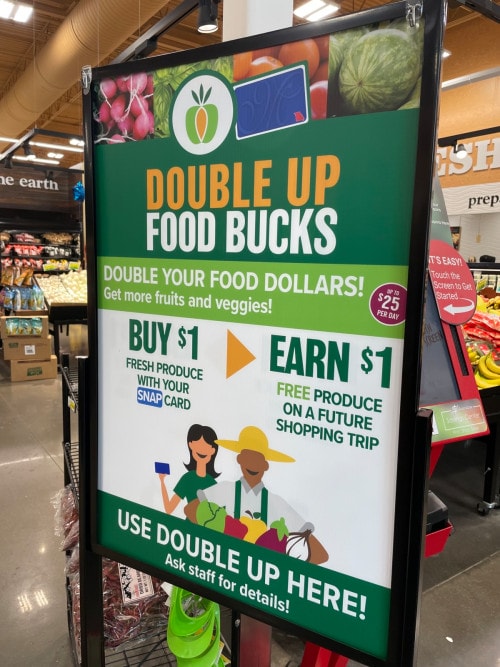
In other ways, store management works around public assistance rules that might keep people from having a nutritious meal.
Food from the hot counter — breakfast items like fried eggs, waffles, hash browns and sausage — are also packaged and sold in a separate case. Hot food is not allowed to be purchased under some of the assistance programs.
Bolillos, a short baguette-like bread, are among the items catering to the area’s growing Latino population.
A wide selection of smoked meats for greens is offered, especially around big family holidays like Thanksgiving. Jiffy brand corn muffin mix is the store’s number one selling item.
And staffers sometimes buy sandwiches for people, knowing that they have no money. It’s better than watching them risk stealing food.
Shoplifting is an issue.
One man, nondescript in most ways, would stroll into the Sun Fresh each day, ready for breakfast.
He bought a hot meal and then ate at one of the tables inside the grocery store.
At the end of his meal, he’d ask for an extra bag.
The man would then cruise the aisles, filling up his bag, mostly with pricey cuts of meat.
Then he’d walk out, bypassing the cashier, and begin selling the meat in the parking lot for cash.
He’s one example of why the store changed procedures. Higher end cuts of meat and seafood items must be requested at the back of the store, where staffers package the items and walk them up to the cashier for checkout.
Cashiers also are trained to watch for sticker switchers, shoppers who give themselves a markdown on desired items by replacing a higher price tag with a lower one.
And backpacks must be left with the security guard at the front of the store.
Melia Hargrove isn’t bothered by the rules, or occasionally encountering a disruptive fellow customer.
She carried her purchases to her car one recent afternoon, three plastic bags filled with noodles, chips and a few other items.
If not Sun Fresh, she buys groceries at Save A Lot, and sometimes Walmart, but prefers Sun Fresh.
“I like that it’s clean and neat,” she said.
African American Resilience, ‘Yesterday to Today’
On the eastern edge of the Sun Fresh parking lot, as it stretches towards Prospect Avenue, The Linwood Center Memorial rises to Black Kansas City.
Five figures at the top of the tall sculpture gaze northward.
The accompanying description is titled “Yesterday to Today.” The work was created by Ed Dwight, who was the first African American to be trained as an astronaut. Racism kept him from traveling in space.
Now 90, the Kansas-raised Dwight is profiled in a new documentary, “The Space Race,” which chronicles his story.
Family Legacy
Dwight’s father played baseball for the Monarchs in the Negro Leagues.
The Linwood memorial is reminiscent of Dwight’s other artistic works, steeped in respect for African American accomplishments.
It tells the story of Black people in Missouri, via a series of accompanying metal plaques.
They were brought in the 1700s as enslaved people to toil as miners, the exhibit notes.
Waves of Black settlement, some as people left southern states, are detailed, along with the community’s business diligence. The sculpture notes: “By 1911, there were 85 tailor shops, 75 pool halls, 25 dry cleaners, 4 funeral parlors, 7 night clubs, & a number of restaurants owned by Blacks.”
Long lists of accomplishments in many fields are cited, such as the first local African American woman to pass the bar and practice law, Leona Pouncey Thurman.
The land that the shopping center occupies, now owned by the city, was once the site of St. Joseph Hospital. The hospital was built in 1917 but closed in the 1960s when it moved to its current location near Interstate 435 and State Line Road.
“The site lay dormant and blighted for nearly 20 years,” one of the plaques reads.
Maxwell, as a developer and president of the Community Development Corp., is also cited.
It was Maxwell, along with the Baptist Ministers Union and the late Rev. Wallace S. Hartsfield Sr., who led the redevelopment of the Linwood Shopping Center, including the original grocery store, opening in 1986.
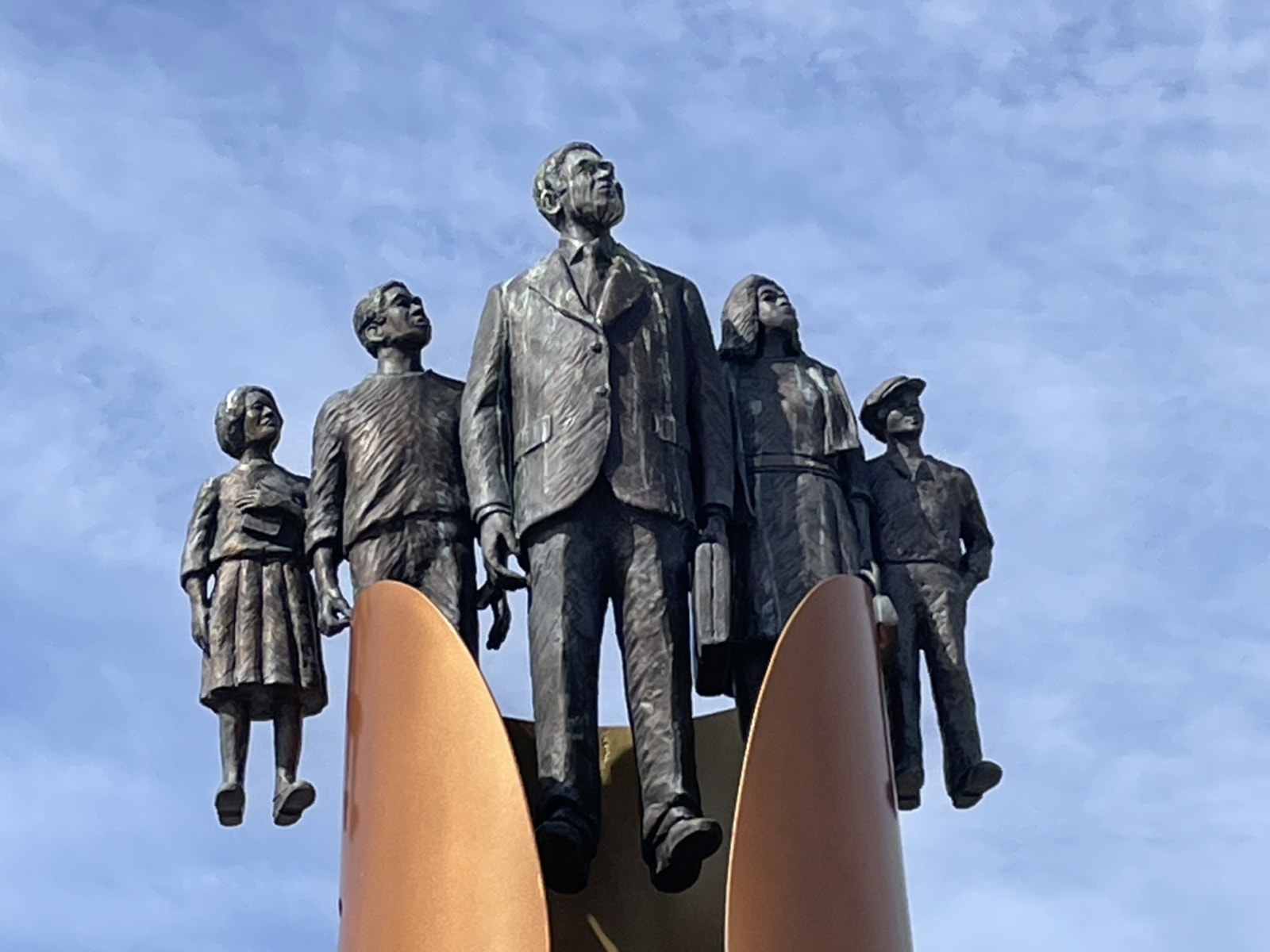
The unwavering commitment to support the area businesses is fueled by such history, with people stepping up for the betterment of the community.
But Community Builders never intended to enter the grocery business.
The nonprofit is the area’s largest urban core developer, investing $225 million since 1991 in urban renewal projects.
The organization currently has an $80 million portfolio, including more than 700 units of housing and more than 200,000 square feet of commercial retail/office space, according to its website.
But when the two groceries became available, it was either step up, or accept the health consequences that an expanding food desert would mean for the community.
Looking the other way would go against the mission of Community Builders, said Kenneth Bacchus, board chair.
The organization’s mission statement is “Community Builders of Kansas City changes the landscape by igniting and fueling equity, access, opportunity and advocacy.”
Status updates on the two groceries are a staple at all board meetings, Bacchus said.
“It’s costing us money and we are trying to find a way to make it more financially feasible,” Bacchus said.
The Linwood location is busier, drawing in more revenue than the Blue Parkway store, despite its role during Chiefs and Royals games, when people stop on the way to the stadium for tailgating staples.
A remodeling of the Blue Parkway location is underway.
“On Prospect, there aren’t many grocery choices nearby,” Bacchus said.
Much of the frustration is focused on a lack of attention from the city, which owns the building, despite numerous meetings.
“We will remain hopeful and believe that this can work,” Bacchus said. “It’s just very difficult to operate a store in an area where we have all of these issues.”
Mary Sanchez is senior reporter for Kansas City PBS.


